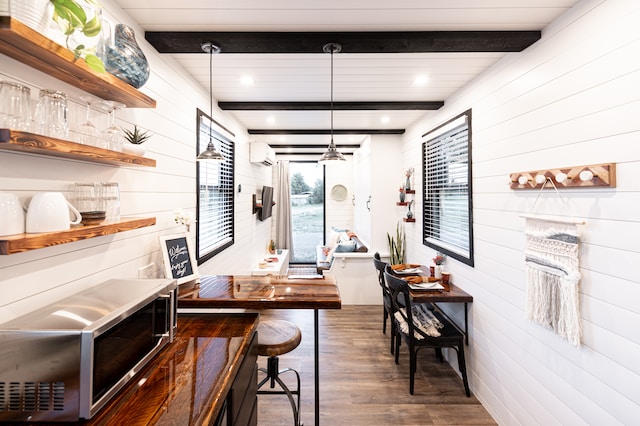Published May 22, 2023
The Rise of Tiny Homes in Florida: Pros and Cons for Homebuyers

In recent years, the housing market has witnessed a growing trend in the popularity of tiny homes across the United States. This unique housing option offers a minimalist lifestyle and the potential for reduced costs. Florida, known for its vibrant communities and diverse real estate market, has embraced the tiny home movement. This article aims to explore the pros and cons of tiny homes in Florida, providing homebuyers with valuable insights to make informed decisions.
Pros of Tiny Homes in Florida
Affordability
Before you start searching for a new home, you should consider whether you can afford it. One of the primary advantages of tiny homes is their affordability. Tiny homes come with a significantly lower purchase price than traditional homes. This allows homebuyers to achieve homeownership with less financial burden. Additionally, tiny homes have the potential for reduced utility costs due to their smaller size, making them an attractive option for budget-conscious individuals.
Mobility and Flexibility
Tiny homes offer a unique level of mobility and flexibility. Unlike traditional homes, these compact dwellings are designed for easy relocation. This feature appeals to those who desire a more nomadic lifestyle or who wish to experience different communities without the commitment of permanent residence. Additionally, tiny homes promote a minimalist lifestyle, encouraging individuals to declutter and prioritize experiences over material possessions.
Environmental Sustainability
Another significant advantage of tiny homes is their environmental sustainability. With a smaller footprint and a focus on the efficient use of resources, tiny homes in Florida have a reduced environmental impact. They require fewer materials during construction and consume less energy for heating and cooling. Embracing a tiny home lifestyle aligns with the growing emphasis on sustainable living practices, making it an appealing option for environmentally conscious homebuyers.
Cons of Tiny Homes in Florida
Zoning and Legal Considerations
One of the significant challenges tiny home enthusiasts face in Florida is finding suitable locations to park or build their homes. Zoning regulations and building codes can vary from one municipality to another, making it difficult to find legal spaces for tiny homes. Potential homebuyers must thoroughly research local regulations and consult with experts to ensure compliance. Overcoming these legal hurdles can be time-consuming and may limit the options available to those interested in tiny homes.
Resale Value
Tiny homes have a relatively niche market compared to traditional homes, which can affect their resale value. While the demand for tiny homes is growing, finding potential buyers who specifically seek out these unique dwellings may be challenging. As a result, tiny homes may experience a slower appreciation rate or even depreciation compared to more traditional housing options. Homebuyers should consider the long-term implications and potential market limitations before investing in a tiny home.
Limited Space
While the compact size of tiny homes is advantageous for some, it can also be a drawback for others. The limited space poses challenges in terms of storage and living arrangements. Homebuyers considering tiny homes should carefully assess their lifestyle and belongings to ensure they can adapt to a smaller living space.
Additionally, the proximity within a tiny home may lead to a sense of feeling cramped or restricted, particularly for individuals accustomed to more spacious living quarters. When planning a move, experts from AmeriSafe Moving Services suggest looking for a rental storage solution. This might be necessary if you plan to live in a tiny home that lacks space.
Financing and Insurance Considerations
When considering a purchase of tiny homes in Florida, prospective homebuyers should be aware of specific financing and insurance considerations.
Financing Options
Financing a tiny home can differ from obtaining a loan for a traditional home. While some financial institutions offer loans tailored to tiny homes, others may have stricter criteria or consider their recreational vehicles. Exploring different financing options and consulting with lenders specializing in tiny home loans is essential to find the best solution for individual circumstances.
Insurance Coverage
Insuring a tiny home in Florida can also be challenging. Many insurance companies do not offer specific policies for tiny homes, leading to limited coverage options. Factors such as the home's size, mobility, and location can influence the availability and cost of insurance. Homebuyers must carefully research insurance providers who understand the unique aspects of tiny home coverage to ensure adequate protection.
Are you moving to Florida soon?
If you’re planning to move to one of the tiny homes in Florida, it is essential to ease the transition by hiring local movers who understand the unique challenges and logistics of the state. Whether you are relocating within the state or moving from another region, it is crucial to find experts in your area.
Local movers are well-versed in the local regulations, traffic patterns, and neighborhoods, ensuring a smoother and more efficient moving process. They possess the knowledge and experience to navigate any potential hurdles and can provide valuable insights and guidance. By entrusting your move to local professionals, you can alleviate the stress and uncertainties associated with relocation, allowing you to focus on settling into your new Florida home with peace of mind.
Conclusion
The rise of tiny homes in Florida presents pros and cons for homebuyers. The affordability, mobility, and environmental sustainability of tiny homes make them attractive to those seeking a minimalist lifestyle. However, limited space, zoning restrictions, and potential resale challenges require careful consideration. Ultimately, embracing tiny home living in Florida requires thorough research and self-reflection to align with individual preferences and lifestyle goals.





